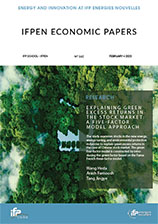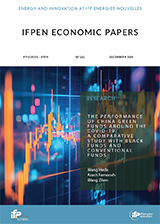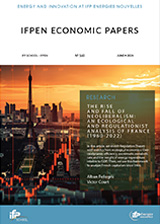14.02.2025
20 minutes of reading
The collection “IFPEN Economic Papers” – formerly « Les Cahiers de l’Économie », since 1990 – aims to present work carried out at IFP Energies nouvelles and IFP School dealing with economics, finance or management of the energy transition.
 Explaining Green Excess Returns in the Stock Market: A Five-Factor Model Approach
Explaining Green Excess Returns in the Stock Market: A Five-Factor Model Approach
N° 162 – February 2025 [ RESEARCH ]
Wang Heda, Arash Farnoosh and Tang Jingyea
The study examines stocks in the new energy, energy-saving, and environmental protection industries to explain green excess returns in the case of Chinese stock market. The green four-factor model is constructed by introducing the green factor based on the Fama-French three-factor model. Empirical results show that this model better explains the risk-return of green concept stocks compared to the three-factor model by verifying the existence of green excess returns, though its explanatory power still needs improvement. Therefore, the study uses stock turnover rate and the firm's return on investment as indicators of the sentiment factor and the efficiency factor, respectively, from the perspectives of green investment sentiment in behavioral finance and positive externalities in microeconomics. The green five-factor model is then constructed by introducing the green sentiment factor and green efficiency factor. Empirical results show that the green five-factor model better interprets the risk-return of green concept stocks compared to the three-factor model and the green four-factor model, with the green sentiment factor and green efficiency factor having a significant positive effect on the return of green concept stocks.![]() Read the article / Download (PDF - 6.7 Mo)
Read the article / Download (PDF - 6.7 Mo) ![]()
 The Performance of China Green Funds around the COVID-19: A Comparative Study with Black Funds and Conventional Funds
The Performance of China Green Funds around the COVID-19: A Comparative Study with Black Funds and Conventional Funds
N° 161 – December 2024 [ RESEARCH ]
Wang Heda, Arash Farnoosh and Wang Zhen
The analysis covers 102 green funds, 64 black funds, and 434 conventional funds in China, comparing their performance over 93 sample intervals from November 2015 to July 2023. The performance of green and black funds is significantly higher than that of conventional funds over the entire sample period, primarily due to the greater impact of COVID-19 on the industries in which conventional funds invest. Notably, green funds outperform black funds. When dividing the sample period at the onset of COVID-19, it is found that conventional funds generally outperform green and black funds before the pandemic, while green and black funds significantly outperform conventional funds during COVID-19. After COVID-19, as the state promotes economic recovery, conventional funds again outperform green and black funds. Overall, the performance of green funds gradually improves over time, with increased investment in large-cap and growth stocks.![]() Read the article / Download (PDF - 4.1 Mo)
Read the article / Download (PDF - 4.1 Mo) ![]()
 The rise and fall of Neoliberalism: an ecological and regulationist analysis of France (1960-2022)
The rise and fall of Neoliberalism: an ecological and regulationist analysis of France (1960-2022)
N° 160 – June 2024 [ RESEARCH ]
Alban Pellegris and Victor Court
In this article, we enrich Regulation Theory with metrics from ecological economics: thermodynamic efficiency, exosomatic metabolic rate and the weight of energy expenditure relative to GDP. Then, we use this framework to analyze French capitalism since 1960.![]() Read the article / Download (PDF - 3.4 Mo)
Read the article / Download (PDF - 3.4 Mo) ![]()
 Decarbonizing China’s iron and steel industry: policy incentives and technological paths
Decarbonizing China’s iron and steel industry: policy incentives and technological paths
N° 159 – April 2024 [ RESEARCH ]
Yang Liu, Yuchen Zhang, Xiaoli Zhao, Rongda Zhang and Arash Farnoosh
This article develops a mixed integer programming model to explore how the Chinese iron and steel industry can efficiently manage the simultaneous phasing out of blast furnaces and promotion of advanced steelmaking technologies.![]() Read the article / Download (PDF - 4 Mo)
Read the article / Download (PDF - 4 Mo) ![]()
 Synergistic effect analysis of policy instruments in environmental governance considering the social context
Synergistic effect analysis of policy instruments in environmental governance considering the social context
N° 158 – March 2024 [ RESEARCH ]
Yang Liu, Yuchen Zhang, Arash Farnoosh, Ruoran Ma and Xiaoli Zhao
This article assess the synergistic effects between policy instrument combinations and social contexts in the field of environmental governance in 29 province-level regions in China, from 2006 to 2018. ![]() Read the article / Download (PDF - 6 Mo)
Read the article / Download (PDF - 6 Mo) ![]()
 ORION - Oil and renewables refining industry optimization and synergies
ORION - Oil and renewables refining industry optimization and synergies
N° 157 – February 2024 [ RESEARCH ]
Clarissa Bergman-Fonte, Fernanda P. D. C. Guedes, Frédéric Lantz, Pedro R. R. Rochedo and Alexandre Szklo.
This article introduces ORION, a GAMS-based Mixed Integer Linear Programming model designed to optimize the refining sector. ORION addresses not only conventional refinery operations, but also focuses on novel opportunities for integrating the sector into a context of carbon intensity reduction.![]() Read the article / Download (PDF - 4.1 Mo)
Read the article / Download (PDF - 4.1 Mo) ![]()
 Decarbonizing aviation with sustainable aviation fuels: myths and realities of the roadmaps to net zero by 2050
Decarbonizing aviation with sustainable aviation fuels: myths and realities of the roadmaps to net zero by 2050
N° 156 – October 2023 [ RESEARCH ]
Paul Bardon, Olivier Massol
This paper analyzes the factors influencing present and future sustainable aviation fuels sustainable aviation fuels SAF) market availability – namely resources, technologies, and costs – and attempts to assess the credibility of current SAF development scenarios.![]() Read the article / Download (PDF - 3.4 Mo)
Read the article / Download (PDF - 3.4 Mo) ![]()
 HERA – Hydrogen economics and infrastructure optimization model
HERA – Hydrogen economics and infrastructure optimization model
N° 155 – June 2023 [ RESEARCH ]
Gabriela Nascimento da Silva, Frédéric Lantz, Pedro Rochedo, Alexandre Szklo
The article develops an optimization model of the whole hydrogen value chain, from the H2 production (including water electrolysis and steam reform with and without carbon capture) up to the H2 delivery to consumers via road transportation or pipelines.![]() Read the article / Download (PDF - 2.1 Mo)
Read the article / Download (PDF - 2.1 Mo) ![]()
 EROI minimum et croissance économique
EROI minimum et croissance économique
N° 154 – Mai 2023 [ RECHERCHE ]
Victor Court, Floriane Fizaine
Après avoir rappelé les concepts d’énergie nette et d’EROI, simples et intuitifs en apparence, nous détaillerons les raisons pour lesquelles l’utilisation de ces notions est difficile en pratique. Nous reviendrons ensuite sur les résultats les plus importants en ce qui concerne le EROI minimum requis pour observer une croissance de l’activité dans une économie moderne. Nous discuterons enfin des notions de croissance, de prospérité et de leurs liens avec l’EROI et la sobriété.![]() Read the article / Download (PDF in French - 1 Mo)
Read the article / Download (PDF in French - 1 Mo) ![]()
 Modeling CO2 pipeline systems: An analytical lens for CCS regulation
Modeling CO2 pipeline systems: An analytical lens for CCS regulation
N° 153 – April 2023 [ RESEARCH ]
Adrien Nicolle, Diego Cedreros, Olivier Massol, Emma Jagu Schippers
Carbon Capture and Storage (CCS) is regularly depicted as a crucial technology to reduce the social cost of achieving carbon neutrality. However, its deployment critically depends on the installation of CO2 infrastructures. As the regulatory procedures governing their provision are yet to be clarified, the purpose of this paper is to assess the social and environmental impacts of such regulations. We show how the engineering equations of a CO2 pipeline implicitly define a Cobb-Douglas production function. ![]() Read the article / Download (PDF - 1.1 Mo)
Read the article / Download (PDF - 1.1 Mo) ![]()
 Is Power-to-Gas always beneficial? The implications of ownership structure
Is Power-to-Gas always beneficial? The implications of ownership structure
N° 152 – February 2023 [ RESEARCH ]
Camille Megy, Olivier Massol
Power-to-gas (PtG), a technology that converts electricity into hydrogen, is expected to become a core component of future low-carbon energy systems. While its economics and performance as a sector coupling technique have been well studied in the context of perfectly competitive energy markets, the distortions caused by the presence of large strategic players with a multi-market presence have received little attention. In this paper, we examine them by specifying a partial equilibrium model that provides a stylized representation of the interactions among the natural gas, electricity, and hydrogen markets.![]() Read the article / Download (PDF - 2.5 Mo)
Read the article / Download (PDF - 2.5 Mo) ![]()
> Archives of the articles ("Les Cahiers de l'Economie" - 2010 to 2022)
The form and content may still be provisional, in particular to encourage an exchange of views on the subjects covered. The opinions expressed in this collection are those of the authors and do not necessarily reflect the views of IFP Energies nouvelles or IFP School. Neither these institutions nor the authors accept any liability for loss or damage incurred as a result of the use of or reliance on the content of these publications. For any information on the content, please contact the author directly.







